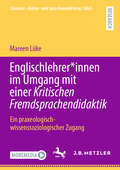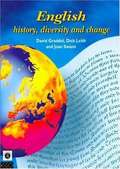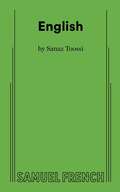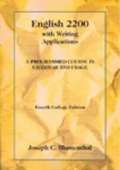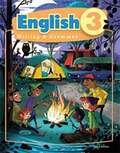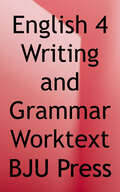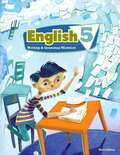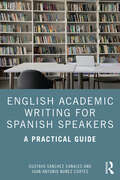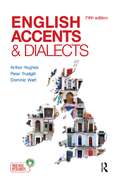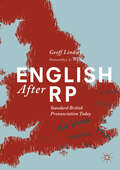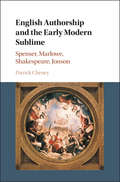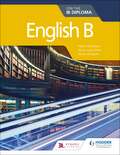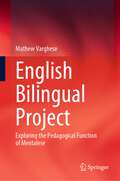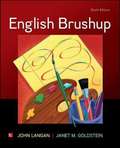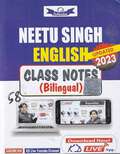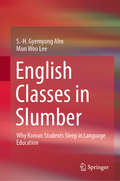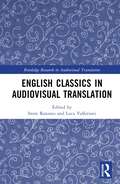- Table View
- List View
Englischlehrer*innen im Umgang mit einer Kritischen Fremdsprachendidaktik: Ein praxeologisch-wissenssoziologischer Zugang (Literatur-, Kultur- und Sprachvermittlung: LiKuS)
by Mareen LükeDie qualitativ-rekonstruktive Studie untersucht das implizite und handlungsleitende Wissen von Englischlehrpersonen nach einer Weiterbildungsmaßnahme zu einer Kritischen Fremdsprachendidaktik. Mithilfe von episodischen Interviews und Dokumentarischer Methode wird die Struktur der unterrichtlichen Praxis durch die Orientierungen der Lehrpersonen rekonstruiert. Hierdurch leistet die Studie einen Beitrag zur Forschung im Bereich der kritischen Fremdsprachenlehrer*innenbildung und der fremdsprachendidaktischen Professionsforschung.
English
by Sanaz ToossiIt's 2008 and four Iranians assemble triweekly in a TOEFL (Test of English as a Foreign Language) class in Karaj Iran. The students are led by Marjan an anglophile who abolishes Farsi from her classroom. They translate Ricky Martin and endure major preposition confusion; they discover how to be funny in English and ponder what they will lose in the process. As the class slowly devolves into a linguistic mess some students cling tighter to their mother tongue while others embrace the possibilities of a new language.
English (Second Language) class 12 - GSTB: અંગ્રેજી (દ્વિતીય ભાષા) ધોરણ ૧૨
by Navneetનવનીત અંગ્રેજી SL 12મા ધોરણનું પુસ્તક, શાળાના વિદ્યાર્થીઓ માટે યોગ્ય. આ એક નવો અભિગમ છે, ખાસ કરીને બાળકો માટે. આ પુસ્તકો બાળકોની મૂળાક્ષરો સમજવા અને શીખવાની ક્ષમતામાં સુધારો કરે છે. આ વિવિધ વિષયો પરનું અત્યંત આકર્ષક અને આકર્ષક પુસ્તક છે.
English (Second Language) class 2 - GSTB
by Gujrat Rajya Pathypustak Mandalધોરણ 1 અને 2 માં વિદ્યાર્થીઓના માત્ર શ્રવણ અને કથન કૌશલ્યો પર જ ધ્યાન કેન્દ્રિત કરીશું. વાંચન અને લેખન કૌશલ્યો શીખવાની પ્રક્રિયા ધોરણ 3 થી ચાલુ થશે.
English (Second Language) class 3 - GSTB
by Gujrat Rajya Pathypustak Mandalધોરણ - 3 થી વાંચન અને લેખન કૌશલ્યો શીખવવાની પ્રક્રિયા શરૂ કરીએ છીએ. વાંચન અને લેખન કૌશલ્યોનો પ્રારંભ કરાવવા માટે આ પાઠ્યપુસ્તક ઘડાયું છે. જે શબ્દો બોલતાં આવડે છે તે શબ્દોનું હવે વાંચન અને લેખન શીખવાનું છે.પ્રસ્તુત પુસ્તક દ્વારા વિદ્યાર્થીઓને ગમતી પ્રવૃત્તિઓનો સમાવેશ કરીને હસતાં રમતાં અંગ્રેજી આવડે તેવો પ્રયાસ છે.
English (Second Language) class 5 - GSTB
by Gujarat State Board of School TextbooksThe provided textbook for Standard 5 English (Second Language) is designed to develop multilingual communication skills in young learners as outlined in the NEP 2020. The book includes activities such as stories, action songs, games, and exercises to make learning engaging and effective. It emphasizes listening and speaking skills initially and gradually incorporates reading and writing. The text aims to teach English in a fun, interactive manner, avoiding traditional translation methods and extensive grammar explanations. Activities are structured to enhance vocabulary through context and real-life application. Additionally, the book supports continuous assessment and encourages the use of local resources and teaching aids to facilitate effective language learning.
English 10th Standard - Tamilnadu Board
by Training State Council of Educational ResearchEnglish Textbook for the 10th Standard Students, preparing for Tamil Nadu State Board Exam.
English 2200 with Writing Applications: A Programmed Course in Grammar and Usage (Fourth College Edition)
by Joseph C. BlumenthalENGLISH 2200, ENGLISH 2600, and ENGLISH 3200 are the original programmed courses in grammar, usage, sentence-building, capitalization, and punctuation.
English 2: Writing & Grammar
by Gina Bradstreet Sandra Bircher Christine ThomasThe English 2: Writing and Grammar (3rd ed.) Student Text is a colorful, inviting, grade appropriate worktext for the second grader. Students focus on understanding the subject and verb parts of sentences, and they will be able to locate the subject and verb of a sentence on completion of the course.
English 3: Writing and Grammar Worktext
by Bju PressThe student edition combines grammar and writing practice in one consumable book. Grammar chapters emphasize traditional grammar to support the writing chapters. Paragraph development is simplified with a color-coded paragraph structure showing a topic sentence, detail sentences, and a concluding sentence. In the writing chapters, the step-by-step writing process enables the students to write reports, essays, and other assignments with confidence. <p><p>Additional writing opportunities are available in the grammar lessons. The grammar skills build from lesson to lesson, providing spiral review of previously learned concepts. The worktext provides opportunities for teacher-guided practice, independent practice, chapter reviews, and cumulative reviews. A handbook in the back matter includes a thesaurus, grammar songs, capitalization rules, and abbreviations charts.. - Publisher.English 3 Writing and Grammar Worktext
English 4 Writing and Grammar Worktext
by Bju PressThis book helps the fourth graders build lifelong skills with this easy-to-use curriculum. They'll learn about grammar concepts including adjectives, adverbs, prepositions, and prefixes---and how to write poetry, stories, book reviews, essays, research papers, and more. Includes a teacher's edition, student worktext, tests, and answer key.
English 5: Writing and Grammar Student Worktext
by Bju PressBJU Press’ English 5 3rd Edition Worktext combines grammar and writing practice in one volume. Grammar concepts include parts of speech, sentence structure, conventions, and usage. Writing practice covers paragraph development, the writing process, editing, and proofreading. Activities to develop study and research skills are also provided along with assignments for journal and reflection pages. Writing projects include diamante and sense poem styles, book review, compare-contrast essay, persuasive letter, personal narrative, and a research report. Students will learn key study skills like taking notes, outlining, internet safety, keyword searches, source reliability and research skills like types of reference books, using the library, and using the internet. The Teacher Edition is sold separately. 400 pages, softcover. Grade 5.
English Academic Writing for Spanish Speakers: A Practical Guide
by Gustavo Sánchez Canales Juan Antonio Núñez CortésEnglish Academic Writing for Spanish Speakers: A Practical Guide offers step-by-step guidance on writing and publishing academic work in English, providing essential tools and strategies to master academic writing. The book is divided into two parts. The first one, "Theory," examines key issues about academic writing: what it is and the different types of academic genres, such as research papers, essays, cover letters, and CVs/résumés. The second part, "From Theory to Practice," provides clear, simple explanations of these same genres, which are followed by authentic examples of academic texts from Spanish scholars in the areas of social sciences and humanities, and a checklist of common errors. Readers will gain confidence and proficiency in academic writing, benefiting from practical advice and real-world examples tailored specifically to the challenges faced by Spanish speakers.This detailed guide to academic writing will be an invaluable resource for Spanish-speaking undergraduate and postgraduate students, doctoral candidates, teachers, and researchers publishing academic work in English.
English Accents and Dialects: An Introduction to Social and Regional Varieties of English in the British Isles, Fifth Edition (The English Language Series)
by Peter Trudgill Arthur Hughes Dominic WattEnglish Accents and Dialects is an essential guide to contemporary social and regional varieties of English spoken in the British Isles today. Together with invaluable overviews of numerous regional accents and dialects, this fifth edition provides a detailed description of key features of Received Pronounciation (RP) as well as several major non-standard varieties of English.Key features: main regional differences are followed by a survey of speech in over 20 areas of the UK and Ireland, audio samples of which are available to download at www.routledge.com/cw/hughes recent findings on London English, Aberdeen English and Liverpool English contains new entries on Hull, Manchester, Carlisle, Middlesbrough, Southampton, London West Indian, Lancashire and the Shetlands additional exercises with answers online accompany the new varieties clear maps throughout for locating particular accents and dialects. This combination of reference manual and practical guide makes this fifth edition of English Accents and Dialects a highly useful resource providing a comprehensive and contemporary coverage of speech in the UK and Ireland today.
English After RP: Standard British Pronunciation Today
by Geoff LindseyThis book concisely describes ways in which today's standard British English speech differs from the upper-class accent of the last century, Received Pronunciation, which many now find old-fashioned or even comic. In doing so it provides a much-needed update to the existing RP-based descriptions by which the sound system of British English is still known to many around the world.The book opens with an account of the rise and fall of RP, before turning to a systematic analysis of the phonetic developments between RP and contemporary Standard Southern British (SSB) in vowels, consonants, stress, connected speech and intonation. Topics covered include the anti-clockwise vowel shift, the use of glottal stops, 'intrusive r', vocal fry and Uptalk. It concludes with a Mini Dictionary of well over 100 words illustrating the changes described throughout the book, and provides a chart of updated IPA vowel symbols.This book is an essential resource for anyone interested in British pronunciation and sound change, including academics in phonetics, phonology, applied linguistics and English language; trainers of English teachers; English teachers themselves; teachers of voice and accent coaches; and students in those areas.
English Authorship and the Early Modern Sublime: Fictions Of Transport In Spenser, Marlowe, Jonson, And Shakespeare
by Patrick CheneyPatrick Cheney's new book places the sublime at the heart of poems and plays in late sixteenth- and early seventeenth-century England. <P><P>Specifically, Cheney argues for the importance of an 'early modern sublime' to the advent of modern authorship in Spenser, Marlowe, Shakespeare, and Jonson. Chapters feature a model of creative excellence and social liberty that helps explain the greatness of the English Renaissance. Cheney's argument revises the received wisdom, which locates the sublime in the eighteenth-century philosophical 'subject'. <P>The book demonstrates that canonical works like The Faerie Queene and King Lear reinvent sublimity as a new standard of authorship. This standard emerges not only in rational, patriotic paradigms of classical and Christian goodness but also in the eternizing greatness of the author's work: free, heightened, ecstatic. Playing a centralizing role in the advent of modern authorship, the early modern sublime becomes a catalyst in the formation of an English canon.<P> The first book to place the sublime at the heart of poems and plays in late sixteenth- and early seventeenth-century England.<P> Links recent work on the classical or medieval sublime and the modern sublime.<P> Introduces a new model of authorship featuring an aesthetics of sublimity focussing on writers such as Edmund Spenser, Christopher Marlowe, William Shakespeare, and Ben Jonson.
English B for the IB Diploma
by Hyun Jung Owen Mark McGowan Aaron DeupreeExam board: International BaccalaureateLevel: IB DiplomaSubject: EnglishFirst teaching: September 2019First exams: Summer 2021Develop competent communicators who can demonstrate a sound conceptual understanding of the language with a flexible course that ensures thorough coverage of the updated English B Guide and is designed to meet the needs of all IB students at Standard and Higher Level.- Empower students to communicate confidently by exploring the five prescribed themes through authentic texts and skills practice at the right level, delivered in clear learning pathways. - Ensure students are able to produce coherent written texts and deliver proficient presentations with grammar and vocabulary introduced in context and in relation to appropriate spoken and written registers. - Improve receptive skills with authentic written texts, audio recordings spoken at a natural pace, and carefully crafted reading and listening tasks.- Promote global citizenship, intercultural understanding and an appreciation of English cultures through a wide range of text types and cultural material from around the world. - Deliver effective practice with a range of structured tasks within each unit that build reading, listening, speaking and writing skills.- Establish meaningful links to TOK and CAS, and identify learner profile attributes in action.The audio for the Student Book is FREE to download from www.hoddereducation.com/ibextras
English B for the IB Diploma
by Hyun Jung Owen Mark McGowan Aaron DeupreeExam board: International BaccalaureateLevel: IB DiplomaSubject: EnglishFirst teaching: September 2019First exams: Summer 2021Develop competent communicators who can demonstrate a sound conceptual understanding of the language with a flexible course that ensures thorough coverage of the updated English B Guide and is designed to meet the needs of all IB students at Standard and Higher Level.- Empower students to communicate confidently by exploring the five prescribed themes through authentic texts and skills practice at the right level, delivered in clear learning pathways. - Ensure students are able to produce coherent written texts and deliver proficient presentations with grammar and vocabulary introduced in context and in relation to appropriate spoken and written registers. - Improve receptive skills with authentic written texts, audio recordings spoken at a natural pace, and carefully crafted reading and listening tasks.- Promote global citizenship, intercultural understanding and an appreciation of English cultures through a wide range of text types and cultural material from around the world. - Deliver effective practice with a range of structured tasks within each unit that build reading, listening, speaking and writing skills.- Establish meaningful links to TOK and CAS, and identify learner profile attributes in action.The audio for the Student Book is FREE to download from www.hoddereducation.com/ibextras
English Bilingual Project: Exploring the Pedagogical Function of Mentalese
by Mathew VargheseToday, English is the global lingua franca and competent English communication skills should be one of the rights of all educated individuals irrespective of any socio-cultural limits. By introducing a new method, this book focuses on helping any learner to get sufficient communication skills in English as much as in the native language. This method helps one to avoid translating from mother tongue to English. And by using the method of thinking in English, one could acquire the required English bilingual skills naturally. The method is founded on the philosophical idea of mentalese—mind language as the base language of thinking available for humans for constructing thoughts. The proposed English Bilingual Project (EBP) helps one to transfer thoughts from a structureless mentalese to the grammatical structure of any language English/Japanese/Chinese. The method described in this book works in two ways: one it helps one to intuitively understand the working of mentalese; the other is by practicing think in English with the mentalese, one could generate the bilingual brain. The main procedure for transferring thoughts from the mentalese to English is through writing one’s thoughts. This helps one to think effectively in English like one’s own mother tongue. This method works as a prime requirement model for one to generate multilingual skills. The book resourced the idea of mentalese from the classical philosophy, reflects it with the modern generative theories, links it with the studies in neuro-linguistic studies on bilingualism and the bilingual brain.
English Brushup (Sixth Edition)
by Janet M. Goldstein John LanganEnglish Brushup 6e offers a brief and inexpensive guide to the grammar, punctuation, and usage skills that students need most. It offers a combination of features not found in other texts. Its focus is on important skills, self-teaching approach, reasonable size, and outstanding instructor's supplements.
English Class Notes (Bilingual) - Neetu Singh - Competitive Exam
by Neetu SinghA full course book of English notes for those who want to appear general exams - in English with explanations in Hindi - for English language learners. There are 34 chapters with illustrated examples and previous years questions from main general examinations for different posts.
English Classes in Slumber: Why Korean Students Sleep in Language Education
by Mun Woo Lee S.-H. Gyemyong AhnThis book explains why some Korean high school students sleep during English classes in spite of the emphasized value of English in their society. It examines how this sleeping-in-class phenomenon can be understood by means of such marginalized students’ emic outlooks on themselves, the target language, their teachers, schools, and society/culture; and by means of the views of teachers who have experienced such in-class sleepers. To understand the phenomenon more holistically, it pursues a multi-disciplinary approach drawing on studies of demotivation and amotivation, psychological needs, and student experiences of schooling, as well as sociocultural theories of learning and agency and of interpersonal dynamics, among others. On the basis of a multi-modal analysis of interview data from the student and teacher participants, it theoretically interprets the phenomenon at the classroom (‘micro-’), school (‘meso-’) and society-culture (‘macro-’) levels. Taking a humanistic/existential approach to education, it subsequently presents a number of cultural actions that it advocates implementing in a situation-sensitive manner to help in-class sleepers and their educational institutions awaken from their chronic slumber. Lastly, it presents practical and theoretical implications for more humanistic pedagogy, and global studies of student disengagement, in English-as-a-foreign-language classes.
English Classics in Audiovisual Translation (Routledge Research in Audiovisual Translation)
by Irene Ranzato Luca VallerianiThis collection explores the translation of dialogue from the adaptations of literary classics across audiovisual media, engaging with the question of what makes a classic through an audiovisual translation lens. The volume seeks to fill a gap on the translation of classic texts in AVT research which has tended to focus on contemporary media.The book features well-known British literary texts but places a special emphasis on adaptations of the works of Jane Austen and William Shakespeare, figures whose afterlives have mirrored each other in the proliferation of film and television adaptations of their work. Chapters analyze myriad modes of AVT, including dubbing, subtitling, SDH, and voice-over, to demonstrate the unique ways in which these modes come together in adaptations of classics and raise questions about censorship, language ideologies, cultural references, translation strategies, humor, and language variation. In focusing on translations across geographic contexts, the book offers a richer picture of the linguistic, cultural, and ideological implications of translating literary classics for the screen and the enduring legacy of these works on a global scale.This book will be of interest to scholars in audiovisual translation, literary translation, comparative literature, film and television studies, and media studies.
